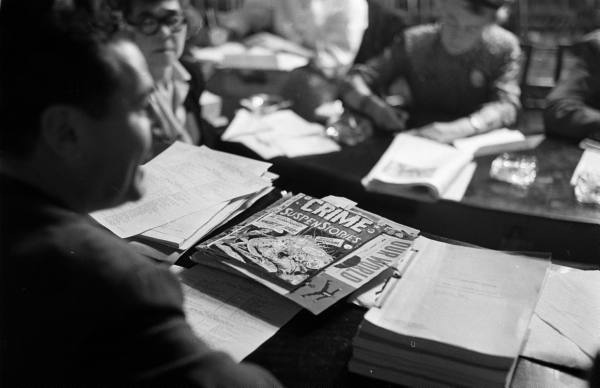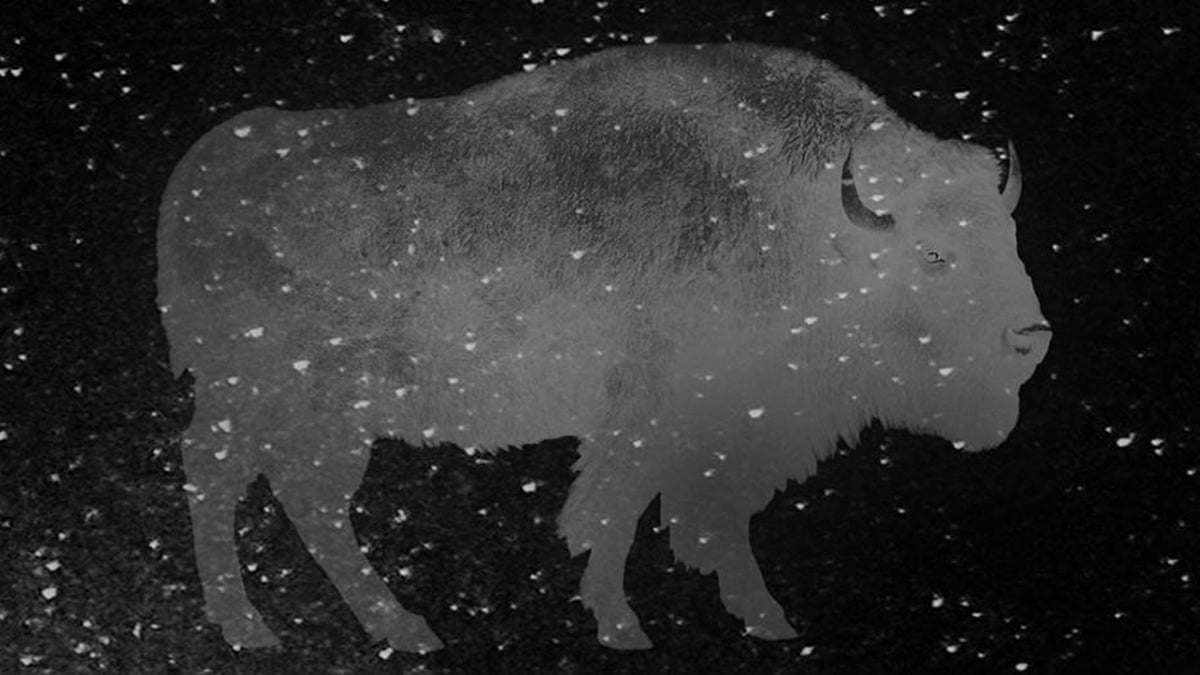While the finding of the check for $130 which National presented to Siegel and Shuster might have been a high point of this year’s comic history, here’s a strong contender for another: the actual audio of the Senate Subcommittee on Juvenile Delinquency hearings on comic books.WNYC has released the first day of the hearings, April 21, 1954. The morning session features Richard Clendenon, Dr. Harris Pack, Henry Edward Schultz and Senator Estes Kefauver, whose witch hunt against comics, aided by Dr. Fredric Wertham’s sensational book, Seduction of the Innocent, set the medium back 50 years.
The afternoon session is the one that you’ll all want to listen to, with Wertham claiming comic books cause juvenile delinquency, and EC publisher William Gaines‘ disastrous testimony, which includes this classic exchange with Kefauver:
Kefauver: Here is your May 22 issue. This seems to be a man with a bloody ax holding a woman’s head up which has been severed from her body. Do you think that is in good taste?
Gaines: Yes, sir; I do, for the cover of a horror comic. A cover in bad taste, for example, might be defined as holding the head a little higher so that the neck could be seen dripping blood from it and moving the body over a little further so that the neck of the body could be seen to be bloody.
Kefauver: You have blood coming out of her mouth.
Gaines: A little.
The 1954 hearings (written about in David Hajdu’s The Ten-Cent Plague: The Great Comic-Book Scare and How It Changed America) led to the complete bowdlerization of the American comics industry, as publishers voluntarily adapted the Comic Code—perhaps the most restrictive written censorship system ever instituted in any American artform—and careers were destroyed overnight.
While the transcripts of the hearings have long been available, now you can listen to the day that almost killed comics for yourself. Photos of the hearings are available in Life Magazine’s archives.
Thanks to Jamie Coville for the link.









Incredible! Thank you for this.
Here’s the real story:
http://www.newcomicsday.com/ncd/2012/03/gaiman-presents-fredric-werthams-past-of-future-days/
Dropped link on the second part:
http://www.wnyc.org/blogs/neh-preservation-project/2012/aug/27/senate-subcommittee-juvenile-delinquency-ii/
This is just the first day, with all the “superstars”. Day Two (04.22.1954) contains testimony from publishers. Day Three (06.04.1954) is mostly testimony from distributors.
“Comic Book Confidential” does contain snippets of the televised hearings. I did not find anything in the Paley Center’s catalog.
Over at the National Archives:
http://www.archives.gov/legislative/guide/senate/chapter-13-judiciary-1947-1968.html#SSJD
s.13.111
“These include most of the first 12 issues of MAD, edited by William F. Gaines, a witness at the 1954 hearings on comic books.”
Many of the comics researched for the hearing were kept, and covers have been scanned.
With all due respect to accepted wisdom on this moment in time, I just can’t accept the “Bill Gaines destroyed comics by not being eloquent” reading. (Not that that’s what you’re saying here — it just got me thinking when you pointed out his disastrous testimony.) It wasn’t the hearings, the book, the doctor, any of the senators, and certainly not any of the witnesses that hurt comics, but the adoption of the Comics Code.
Other publishers successfully battled censorship throughout history; Grove Press and City Lights were pioneers in not taking a governmental beating sitting down. In comics, the biggest players in the industry just folded their hands immediately after a challenge (and not even a legal one). Yet we keep blaming these toothless congressional inquiries as the Big Bad.
And it’s never the responsibility of the artist to correctly explain to an intruding government inquiry why his work is “tasteful.” They really had no business asking the question and his fumbling the answer doesn’t justify that.
I sure hope Steve Bissette works this material into his lectures for the Comics History Seminar class at CCS when he gets back from his Sabbatical!
awesome Heidi! Thanks very much for finding and posting this.
William Gaines seems like he’s simply underprepared for the interrogation. Wertham really has a point about the way race plays out in these comics and how it’s setting up racial intolerance. Gaines could have pointed out plenty of stories that counteract this but just fumbles.
Gaines’ opening point about the problems they are adressing being way bigger than a bunch of his throwaway magazines reminds me of Judas Priest being put on trial for kid’s suicides and the PMRC. Or the instituting of the Hollywood code. It’s so easy to place a blame on something external than entertain the possibility of being at fault.
Really, there’s a very direct line from these trials to the many long years of litigation Hell Lenny Bruce went through, to the current state of the myth that is Free Speech today.
Really interesting stuff!
Would love to see The Beat do more posts like this.
Heidi you are a goddess. Thank you!
Looking forward to listening to this. I did want to point out to other listeners that Bill Gaines had stated in interviews (possibly in Comics Journal #81) that his testimony was less than it could have been due to the fact that he was on medication (diet pills) and, as the effects of the pills wore off during the day, he started to get very tired. It will be interesting when listening to this to see if it’s clear when he starts to fade.
Regarding Heidi being a goddess, I always thought it was self evident and went without saying.
R Haining: I listened to it and found his talking/answers got slower pretty early into the testimony. Right around the time they started questioning Gaines on how his comics help influence against bigotry and not influence towards committing crime.
The link at the bottom of this article claim that the LIFE magazine photos archives has photos of the infamous hearing from 1954, but the dates given for those LIFE photos are from late 1951. Either they are from a different hearing at an earlier date, or somebody has made a mistake at LIFE.
I *think* those photo’s are from the New York hearings.
“Wertham really has a point about the way race plays out in these comics and how it’s setting up racial intolerance.”
Really?? You mean he has a point that lends weight to his slanted interpretation of his “facts”? I hope so … otherwise, if Wertham has buffaloed you as well, I feel very sorry for you.